【教育专用】六年级英语下册 Unit 6 Don’t eat in class单元评价检测
鲁教版(五四学制)英语六年级下册:Unit 6 Don't eat in class. Perio

Unit 6 Don’t eat in class.Period Three【学习目标】1.学习谈论家规.2.学会使用句型: I must…”, “I have to…”, “I can /can’t…3.能阅读有关谈论规章的文章并完成练习.【学习重难点】1.学习谈论家规.2.学会使用句型: I must…”, “I have to…”, “I can /can’t…【学习过程】一、体验学习:I.预习交流1.根据音标拼读单词并牢记;2.自学课文,勾画出重点和疑惑.II.翻译官1.too many rules _______ 2.make your bed _______3.be noisy ____________ 4.read a book ___________5.be strict with sb. ___________ 6.make rules to help us ___________ 7.在周末_________ 8.好运! ________二、课堂导学:I.新课呈现Step1 Free talkT: When you are unhappy about something, who do you like to talk to?Step2 Presentation(1)Learn the new words in 2b.铺她的床_________ /'dɜːti/ _______厨房_________ /'nɒɪzi/ ________喜欢阅读____________ 感到可怕_________(4)阅读2b第二封信,找出Dr. Know的观点并划线.(5)Read the letters again and finish 2c. Check the answers.Step3 Group workDiscuss the difficulties you found in 2b. Try to understand the letters.Step4 聚焦求助信书信称呼中所共有的词汇是________________________.称呼后用_______________,不用冒号.求助信第一句式核心句,即______________________!主题句后是解释说明主题句的细节句.信件结束前一般有明确求助的句子,即_______________________?II.合作交流Group work:收集不同的家规.三、自主检测:( )1.I can’t relax_______.A.too B.also C.either( )2.There are too many _______ in the kitchen.A.vegetables B.milk C.rice( )3.On school nights, I have to go to bed________ 9:00.A.on B.in C.before四、快乐链接:巧记“看”的用法.看电影我们常用see,读书看报用read;电视、戏剧和比赛,凡是表演用watch.。
鲁教版(五四制)英语六年级下册 Unit 6 Don't eat in

Unit 6 Don’t eat in class.【第二课时】【教学目标】1.Learn the new words & phrases: The vocabulary words about school rules.2.Learn the key sentences:(1)To master the words: gym class, uniform, have to.(2)To master the sentences:John, you have to wear sports shoes for gym class. At school, we have to clean the classroom.(3)Train students' ability to use words in context.(4)Train students' reading & writing skills.3.Enable students to listen to and talk about the rules.【教学重难点】1.Grammar Focus.2.Writings.【教学准备】Some cards.【教学过程】Step 1 Warming up and lead-in.In this procedure, ask students to talk about the school rules. Then let them ask about other rules.e.g.: Family rules. Library rules. Class rules, etc.Sample conversation:T: What can you do at school?S: We can...T: What can’t we do?S: We can’t…T: What do you have to do in the library?S:We have to…, etc.Step 2 Work on 2d.1.First, students translate it into Chinese.2.Second, students listen & repeat it.3.Finally, students role-play the conversation.Step 3 Grammar Focus.Go over the grammar focus, translate it into Chinese. Then read aloud the sentences. Ss try to recite them correctly.Step 4 Write the rules for the school library. (3a)In this procedure, students will continue to talk about some rules. They can discuss the rules in groups, write down the answers.Discuss:—Can we speak English?—No, we can’t, but we can speak Chinese, etc.Check their answers and then ask them to show their rules to the class.Step 5 Writings. (3b)Use the words to make questions about the rules. Then write answers according to your school.1.First, Ss read the title, catch the meanings.2.Second, Ss choose the given words to make questions & write answers.3.Finally, check the answers; report the answers to the class.Step 6 Writings. (3c)Make up 5 cool rules for your dream school. Share your rules with the class. Your classmates vote for the coolest school rule.Make a list. Each group shows their list to the class.【作业布置】1.Ask students to copy & translate the Grammar Focus.2.Ask students to learn 3a, 3b, 3c again.。
鲁教版英语六年级下Unit6 Don ‘;t eat in class SectionA(1)
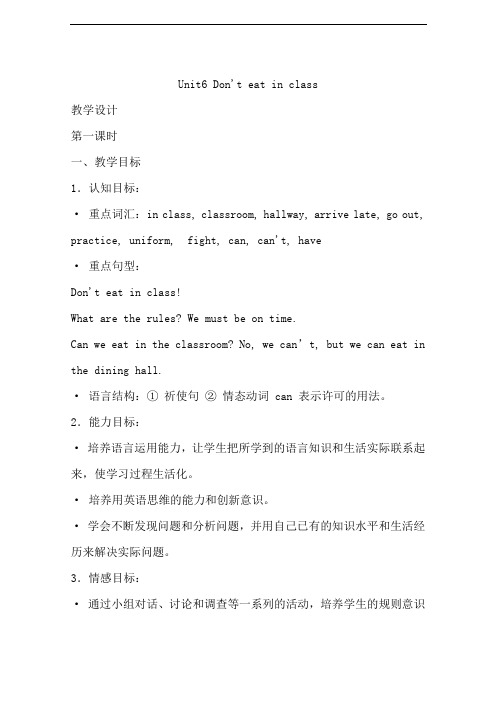
Unit6 Don't eat in class教学设计第一课时一、教学目标1.认知目标:·重点词汇:in class, classroom, hallway, arrive late, go out, practice, uniform, fight, can, can't, have·重点句型:Don't eat in class!What are the rules? We must be on time.Can we eat in the classroom? No, we can’t, but we can eat in the dining hall.·语言结构:①祈使句②情态动词 can 表示许可的用法。
2.能力目标:·培养语言运用能力,让学生把所学到的语言知识和生活实际联系起来,使学习过程生活化。
·培养用英语思维的能力和创新意识。
·学会不断发现问题和分析问题,并用自己已有的知识水平和生活经历来解决实际问题。
3.情感目标:·通过小组对话、讨论和调查等一系列的活动,培养学生的规则意识和合作意识。
4.德育目标:·促进学生养成良好的行为习惯和在良好的道德品质。
二、教学过程Step 1. Warm-upDo you want to be a good student?How to be a good student ?(设计意图:调节课堂气氛、激发学生学习兴趣。
激活学生原有的知识,以旧引新。
)Step 2. Pre-listening1.Look at some pictures in students' daily life and describe theactivities with phrases.①fight② run in the hallways③ eat in class④listen to music in class⑤arrive late for class2. Look and say together( Lead out the topic “rules”)(设计意图:用贴近学生生活的图片激发学生学习规章制度的兴趣, 以自然谈话及直观呈现的方式引导学生学习与话题相关的表达方式,为下一步的语言的输入和交流做好铺垫)Step 3. While-listening1.Listen and answer the questions.Tip: Read the rules in silence before listening.2. Listen again and fill in the blank.Tip: Write down the first letter of the word or phrases, not the whole word.3. Listen and repeat.(设计意图:通过此环节的听力活动,学生在一定的语言情景中进一步学习和理解本课时的目标语言,同时运用一定的听力技巧,逐步提高听的技能和水平.)Step 4. Post-listening1.Pair work.(设计意图: 在图片及相关词汇的提示下, 学生就所学的内容展开初步的模仿式交流,进而理解所学的功能语言.)2. Free talkWhat other rules do you know in your school?3.Listen to a conversation and know some rules in America. (通过了解不同国家的校规增强学生的跨文化意识)4.Group work.①Talk about different rules in different places② Make the poster of different rules.(设计意图: 让学生在互动交流中理解和巩固所学目标语言,在提升他们运用综合语言能力的同时培养了他们团队合作的意识.)Step5. Summary1.Words and phrasesrule, arrive, hallway, fight, outside, (be)on time , dining hall, listen to…2. Sentences(1)—What are the rules ?—We can’t arrive late for class. We must be on time. 2))—Can we listen to music?—We can’t listen to music in the hallways, but we can listen to it outside.Step 6. Homework1. To master the phrases and sentences2. To make rules for your class and put them on the culture wall.。
六年级英语下册Unit 6 Don't eat in class! Section B

6. before 在……之前; after 在……之后; 它们的后面可以跟表示时间的点,也可以 跟一个从句表示时间。 e.g. Wash your hands before dinner. 饭前洗手。 Do your homework after school. 放学后做作业。
Brush your teeth before you go to bed. 睡觉前刷一下牙。 Mrs. Wu usually makes dinner for the family first after she gets home. 吴太太在到家之后通常先为家人做饭。 7. be strict (with sb.) (对某人)严格的 e.g. Our math teacher is very strict. 我们的数学老师很严格。 Are your parents strict with you? 你的父母对你严格吗?
你知道这些规则的意思吗?
Don’t run inside. 不要在室内乱跑。 Don’t push. 不要推搡。 Don’t litter. 不乱扔垃圾。 Save electricity. 节约用电。 Save water. 节约用水。
go out
practice the guitar
do the dishes
see ends
help mom make clean his room breakfast
1a Match the pictures [a-h] with the rules.
___ a go out ___ h see friends ___ c do his homework ___ e practice the guitar ___ b do the dishes ___ g watch TV ___ d help his mom make breakfast ___ f clean his room
鲁教版英语六年级下Unit6 Don ‘;t eat in class SectionB(1)
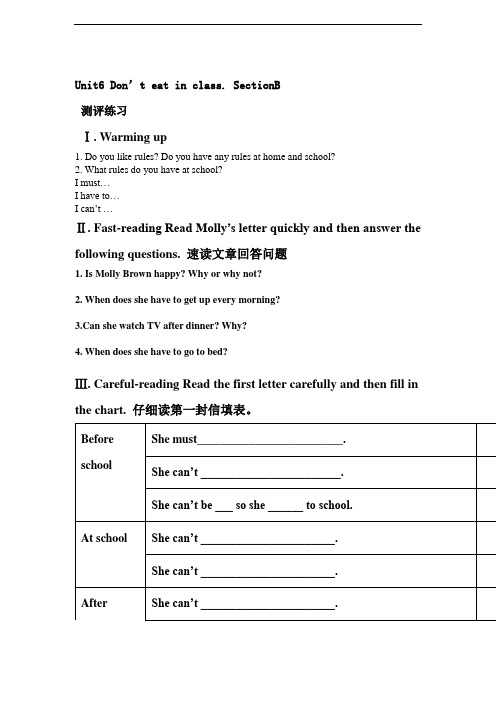
Unit6 Don’t eat in class. SectionB测评练习Ⅰ. Warming up1. Do you like rules? Do you have any rules at home and school?2. What rules do you have at school?I must…I have to…I can’t …Ⅱ. Fast-reading Read Molly’s letter quickly and then answer the following questions. 速读文章回答问题1. Is Molly Brown happy? Why or why not?2. When does she have to get up every morning?3.Can she watch TV after dinner? Why?4. When does she have to go to bed?Ⅲ. Careful-reading Read the first letter carefully and then fill in the chart. 仔细读第一封信填表。
Before school She must_________________________. She can’t ________________________. She can’t be ___ so she ______ to school.At school She can’t _______________________.She can’t _______________________. After She can’t _______________________.school She must ________________________.She must ________________ .She has to ______________________.Read theRead Dr. Know’s letter and then fill in the Blanks.Dr. Know’s ways to help Molly.She has lots of things she can do:1.She can _________________________.2.She can _________________________.3. Parents make rules to ____________.Ⅳ. Group-work:小组讨论Work in groups and then make rules for the following places. (At least 3 for each public place 每个公共场合至少列出三条。
鲁教版六年级下册Unit 6 Don't eat in class

Unit 6 Don’t eat in class.目标:谈论规则语法:can引导的疑问句重点:must情态动词表示必须,务必,一定on time 准时,按时be+形容词/介词短语表示一种状态一、重点短语in class 在课堂上arrive late for class 上课迟到on time 准时in the hallway 在走廊里in the dining hall 在餐厅里listen to 听at school 在学校be late 迟到music player 音乐播放器bring... to school 把……带到学校来have to do 不得不做wear a school uniform 穿校服go out 外出on school nights 在上学期间的晚上practice the guitar 练吉他do the dishes 清洗餐具make breakfast 做早饭make one’s bed 整理床铺leave sth in... 把......丢在.......里read a book 看书think about 考虑make rules 制订规章follow the rules 遵守规章Good luck ! 祝好运!keep sth+ 形容同使......保持.......状态二、重点句型1. Don't eat in class. 在课堂上不准吃东西。
2. Don't arrive late for class, you must be on time. 不准上课迟到,务必守时。
3. Don’t run is the hallways. 不准在走廊内乱跑。
4. Don’t eat in the classroom. You must in the dining hall.不准在教室里吃东西,务必在餐厅里吃东西。
5. Don’t listen to music-in class. 不准在课堂上听音乐。
六下英语Unit6 Don't eat in class

上周一我不得不早上5点起床。
语法总结
• (2) 否定形式:主语+don’t have to+动词原形+其 他 (一般现在时,主语是第三人称单数时, 用doesn’t have to; 句子是过去时, 用didn’t have to) 如:
•
•
Nick doesn’t have to wear a uniform.
Judy can speak a little Chinese.
朱蒂会说一点中文。
I can dance and sing. 歌又能跳舞。 我能唱
语法总结
• (2) 表示允许、许可, “可以”、“能”(在这一课 中新学的词义) Can the students run in the hallways? 学生们可以在走廊上跑吗?
尼克不必穿制服。
•
•
We didn’t have to do our homework at once.
我们不必马上完成作业。
语法总结
• (3) 疑问句: Do (Does或Did) +主语+have to + 动词原形+其他
如: Do you have to stay at home on weekends?
Unit 6
Don't eat in class.
校规
Don’t eat in the classrooms. Don’t sleep in class.
School Rules
Don’t fight.
Don’t run in the hallways. Don’t arrive late for class.
课文解读
SCHOOL RULES
1. Don’t arrive late
【推荐】六年级英语下册 Unit 6 Don’t eat in class课件 鲁教版五四制

二、情态动词can 完成句子 1. 我会说英语。 I ______ ______ English. 答案: can speakபைடு நூலகம்
2. ——你会游泳吗? ——是的,我会。 —______ you ______? —Yes, I ______. 答案: Can; swim; can
3. ——晚上我可以出门吗?
——不,你不能。
—______ I ______ out at night?
—No, you ______.
4. 你不能在课堂上吃东西。
You ______ ______ in class.
答案:3. Can; go; can’t
4. can’t eat
【探究总结】情态动词can的用法 (1)表示能力,意为“能;会”。 (2)表示请求许可,意为“能;可以”。 (3)没有人称和数的变化,后跟动词原形。 (4)其疑问形式直接提前can,否定形式在can的后面加not, 缩写 为can’t。
【探究总结】祈使句的用法 1. 祈使句的含义及构成: (1)祈使句是表示命令、请求、禁止或劝告等的句子,一般不出 现主语,其隐含的主语是you。 (2)祈使句以动词原形开头,句末加句号或感叹号。 (3)表示请求或劝告的祈使句往往在句首或句尾加please。加在 句尾时,必须与前面内容用逗号隔开。
2. 否定的祈使句的句式: (1)Don’t 型,即在祈使句前加don’t。即: ①Don’t +行为动词 +其他 ②Don’t + be +其他 (2)not型 Let’s开头的祈使句变否定句时,变为: Let’s +not +动词原形 +其他 (3)No型 No +名词/动词的-ing形式, 这种句式通常用于公共场 所的提示语或标志中。
鲁教版(五四制)英语六年级下册 Unit 6 Don't eat in class.第一课时 教案

Unit 6 Don't eat in class.【第一课时】【教学目标】1.Learn the new words & phrases: rules, hallway, classroom, Mrs. fight, school rules.2.Learn the key sentences:Don't arrive late for class; Don't fight; Don't run in the hallways; Don't eat in the classroom; Don't listen to music in the classroom; Don't sleep in class; Don't wear hats in class; Don't talk in class; We can't listen to music in the classroom; We Can't fight at school; Can we listen to music, Cindy? We can't listen to music in the hallways, but we can listen to it outside.3.Talk about the school rules and family rules.【教学重难点】1.Talk about the school rules and the target language.2.Learn to talk about the school rules.【教学过程】Step 1 Warming up and lead-inT: Excuse me. What time do you usually get to school?What time does the class begin in the morning?T: So you are early for class. You are a good student. Can you get to class at 8:30?So, don't be late for class. We can also say: don't arrive late for class. This a school rule.Please say the sentence like this: Don't… We can't... We must...S1: Don't eat in the classroom. S2: We can't sleep in classS3: Don' wear hats in class. S4: We can't talk in class.Step 2 Match work (Do 1a)1.In this procedure, students will learn to talk about different school rules.2.Show the pictures and say: “What can you say to him?”3.Now please open your books. Look at the words on the left. They are words about school rules. Please read them. And we have 5 pictures. Try to match the words with the pictures.Encourage the students to say something about the pictures and do the match work. Tell Ss: Weshould obey the rules, don't break the school rules. We should have good habits.Step 3 Listening (Do 1b)T: If you want to be good students, don't break the school rules. The rules are good for your study. But now here are some bad students. Look! Each of these students is breaking one of these rules. Now there are three students Peter, Amy and Mick. What rules are these students breaking? Please listen to the tape and write the numbers after the names.First, ask students to catch 1b's the meanings and look at the pictures in 1a.Next, we'll listen to a recording. In the recording, people are talking about school rules. Let's listen and number the 3 names. Let's see which rule each of the 3 is breaking.Play the recorder. Then check the answers.After this, ask students to repeat after the recording.Step 4 Pair work (Do 1c)SA is a new student. SB is telling SA about the school rules above:e.g.:A: Don't run in the hallways.B: Sorry, I won't.A: what are the rules?B: well, we can't arrive late for class. We must be on time.Ask students to practice the conversation and make their own conversations.Ss work in pairs and practice saying the school rules.Step 5: Work on 2a1.Read the sentences in 1a. Change the sentences with we can't.2.T: Now please open your books. Look! What can you see in the picture?T: Yeah, the boy is Alan, and the girl is Cindy.T: What are they doing?S: They are talking.T: What are they talking about?T: Now let's listen to the tape and check the activities Alan and Cindy talk about.Step 6 Listening (2b)Listen again. Can Alan and Cindy do these activities? Circle “can” or “can't” above.1.Listen and repeat.2.Check the answer then report the list.Report: These are their rules.They can…, but they can't…So please don't…Step 7 (2c)SA is Alan & SB is Cindy. Talk about the rules in 2a.Model: Can we listen to music, Cindy?We can't listen to music in the hallways, but we can listen to it outside.Ss work in groups, practice making conversations. Each group reports to the class.【作业布置】Write the rules in our school with “Don't… We can't... We must...”。
【教育专用】六年级英语下册 Unit 6 Don’t eat in class Section A精练精析
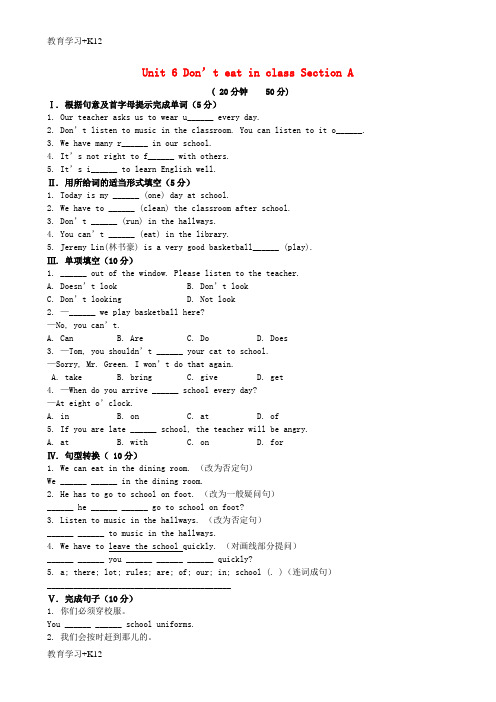
Unit 6 Don’t eat in class Section A( 20分钟 50分)Ⅰ. 根据句意及首字母提示完成单词(5分)1. Our teacher asks us to wear u______ every day.2. Don’t listen to music in the classroom. You can listen to it o______.3. We have many r______ in our school.4. It’s not right to f______ with others.5. It’s i______ to learn English well.Ⅱ. 用所给词的适当形式填空(5分)1. Today is my ______ (one) day at school.2. We have to ______ (clean) the classroom after school.3. Don’t ______ (run) in the hallways.4. You can’t ______ (eat) in the library.5. Jeremy Lin(林书豪) is a very good basketball______ (play).Ⅲ. 单项填空(10分)1. ______ out of the window. Please listen to the teacher.A. Doesn’t lookB. Don’t lookC. Don’t lookingD. Not look2. —______ we play basketball here?—No, you can’t.A. CanB. AreC. DoD. Does3. —Tom, you shouldn’t ______ your cat to school.—Sorry, Mr. Green. I won’t do that again.A. takeB. bringC. giveD. get4. —When do you arrive ______ school every day?—At eight o’clock.A. inB. onC. atD. of5. If you are late ______ school, the teacher will be angry.A. atB. withC. onD. forⅣ. 句型转换( 10分)1. We can eat in the dining room. (改为否定句)We ______ ______ in the dining room.2. He has to go to school on foot. (改为一般疑问句)______ he ______ ______ go to school on foot?3. Listen to music in the hallways. (改为否定句)______ ______ to music in the hallways.4. We have to leave the school quickly. (对画线部分提问)______ ______ you ______ ______ ______ quickly?5. a; there; lot; rules; are; of; our; in; school (. )(连词成句)__________________________________________Ⅴ. 完成句子(10分)1. 你们必须穿校服。
冀教版英语六年级下册Unit 6 Don’t eat in class讲解与练习
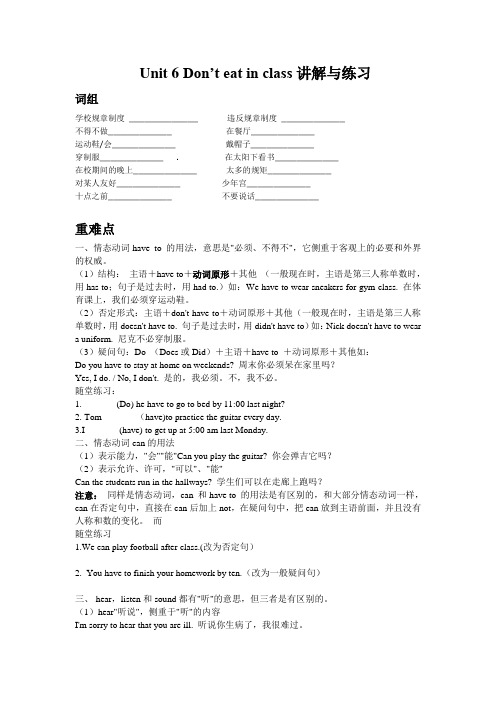
Unit 6 Don’t eat in class讲解与练习词组学校规章制度_____________ 违反规章制度____________不得不做____________ 在餐厅____________运动鞋/会____________ 戴帽子____________穿制服____________ . 在太阳下看书____________在校期间的晚上____________ 太多的规矩____________对某人友好____________ 少年宫____________十点之前____________ 不要说话____________重难点一、情态动词have to 的用法,意思是"必须、不得不",它侧重于客观上的必要和外界的权威。
(1)结构:主语+have to+动词原形+其他(一般现在时,主语是第三人称单数时,用has to;句子是过去时,用had to.)如:We have to wear sneakers for gym class. 在体育课上,我们必须穿运动鞋。
(2)否定形式:主语+don't have to+动词原形+其他(一般现在时,主语是第三人称单数时,用doesn't have to. 句子是过去时,用didn't have to)如:Nick doesn't have to wear a uniform. 尼克不必穿制服。
(3)疑问句:Do (Does或Did)+主语+have to +动词原形+其他如:Do you have to stay at home on weekends? 周末你必须呆在家里吗?Yes, I do. / No, I don't. 是的,我必须。
不,我不必。
随堂练习:1._______(Do) he have to go to bed by 11:00 last night?2.Tom _______(have)to practice the guitar every day.3.I _______(have) to get up at 5:00 am last Monday.二、情态动词can的用法(1)表示能力,"会""能"Can you play the guitar? 你会弹吉它吗?(2)表示允许、许可,"可以"、"能"Can the students run in the hallways? 学生们可以在走廊上跑吗?注意:同样是情态动词,can 和have to 的用法是有区别的,和大部分情态动词一样,can在否定句中,直接在can后加上not,在疑问句中,把can放到主语前面,并且没有人称和数的变化。
六年级英语下册 Unit 6 Don't eat in class Section A(2a4)教案 鲁教版五四制

Unit 6 Don’t eat in class! Section A (2a-4)一、教材分析(一)教材地位分析本单元是鲁教版《新目标》的第六单元。
总体而言,这本教材的词汇量很大,有难度,但是,内容新颖,尤其是生动活泼的卡通化的画面,很符合六年级学生的年龄特点和心理特点,其中还囊括了丰富多彩的文化知识,以及合作探究的活动,十分贴近学生的实际生活经验。
本单元的话题Talk about rules.与日常生活密切相关。
作为一名中学生,遵守校纪班规家法,和社会公共场所的规章制度是必须的。
在谈论规则时,一般运用祈使句、情态动词can和have to等。
这是英语新课程标准中规定所必须掌握的内容,是交际英语中必不可少的项目。
因此,本单元对于提升学生的学习兴趣和提高学生的听、说、读、写能力都有很大的帮助。
(二)教学内容分析本课由两部分构成,第一部分通过学习学校的规章制度展示祈使句和情态动词can的用法,第二部分通过听力和模仿制定各部门的规章制度,对所学祈使句进行巩固和强化。
二、教学目标I.知识目标:(1) 掌握词汇: gym class, uniform, have to ,(2) 掌握交际用语: John, you have to wear sports shoes for gym class. At school, we have to clean the classroom.II.能力目标:(1)培养学生的能力在文中用词的能力。
(2)提高学生听说读写技能III.情感态度价值观目标:(1) 通过合作与竞赛等小组活动形式,,增强学生的集体荣誉感,培养学生的合作意识和竞争意识。
(2) 通过对规章制度的学习与讨论,教育学生从小规范自己的行为。
三、教学重难点1、学习掌握本节课的生词和短语;2、巩固祈使句的用法;3、学习情态动词can表示许可的肯定句、否定句、一般疑问句及肯定、否定回答。
4、提高学生的听说能力。
鲁教版英语六年级下Unit6 Don ‘;t eat in class SectionB (3)

Unit6 Don’t eat in class.Section B教学设计一、教材分析这一单元的中心话题是Talk about rules。
语法是祈使句。
本单元设置了一个日常生活中重要的情景Don’t eat in class 。
学生不但要具备并熟练地掌握祈使句的意识和技巧,并且要会运用这一知识点表达各种规则。
其中,Section B是知识扩展、新旧知识的运用,循序渐进的进行写作练习;运用所学的语言完成各种任务使学生能够对已经学过的目标句型运用自如。
二、学情分析初一下学期的学生具有良好的学习习惯和强烈的用英语表达的欲望;而且乐于开展合作学习。
在本单元的前几课时学生已经掌握了"have to"and "can't".等词的用法,能够运用在句子中,但是他们中的一些同学在准确使用这些词进行口头、笔头表达上还存在一些困难。
三、教学目标1.Read the letter from Zhao Pei to2.Learn to write something about rules using"have to"and "can't".3.Enjoy our lives四、教学重难点(1)Master the use of "have to"and "can't".(2)Read an article and get the detailed information.(3)Make conversations freely.五、课前准备(1)教师准备好上课的课件(2)教师给学生准备好导学案六、教学策略小组合作教学策略七、课时安排本单元第四课时Section B (3a --- Self Check )八、教学过程Step ⅠGreetingsShow the aims1.Read the letter from Zhao Pei to get the detailed (详细的)information.2.Learn to write something about rules using"have to"and "can't".3.Enjoy our livesStep II Group contestThis class we’ll continue having a group contest.思路点拨:直接导入课题之后,出示学习目标,并布置小组任务。
六年级英语下册 Unit 6 Don’t eat in class Section A(Gramma
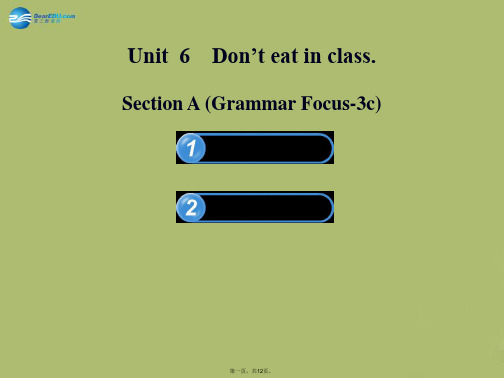
【探究总结】 have to的用法 (1)have to为情态动词,意为“必须,不得不”。第三人称(dì sān rén chēnɡ)单数为 has to,过去时为had to, 将来时为will have to。 (2)否定形式和疑问形式要借助do, does, did 等助动词来完成, 其 否定形式为don’t/doesn’t/didn’t have to, 其疑问形式为: Do/Does/Did. . . have to. . . ?
答案:1. Do; have to
2. doesn’t have to
第十一页,共12页。
3. We can wear our own clothes. (改为一般疑问句,并作否定 (fǒudìng)回答) —______ we ______ our own clothes? —No, you ______. 答案:Can; wear; can’t
Unit 6 Don’t eat in class.
Section A (Grammar Focus-3c)
第一页,共12页。
Ⅰ. 选句子(jùzi)配图
A. Don’t talk. B. Don’t eat food and drink.
C. Don’t take photos.
D. Don’t drink.
答案:2. Can; listen to; can’t
3. don’t have to
第四页,共12页。
have to 必须;不得不 ◆Does he have to wear a uniform at school? 在学校里他必须穿校服(xiào fú)吗? ◆He has to help his mother cook dinner. 他得帮他妈妈做晚饭。 ◆He doesn’t have to clean the room. 他不必打扫房间。
六年级英语下册 Unit 6 Don't eat in class Section A(1a1c)学案 鲁教版五四制

Unit 6 Don’t eat in the class. Section A( 1a-1c)一、【学习目标】:1.词汇:rule, hallway, classroom, fight, Ms2.句型: Don’t arrive late for class.Don’t run in the hallway.Don’t eat in the classrooms.Don’t listen to music in the classroom s or the hallways.Don’t fight.二、【知识学习】:1.值日报告2.旧知回顾Task1.小组展示预习作业3.新知呈现Task1.新课导入T: What’s your favorite subject? Do you like music?Now I’d like to enjoy a song with you. (play the tape)Do you like the song? What do you think of the song?Who is your favorite singer?Can you listen to music in the classroom?Can she/he listen to music in the hallways?Why can’t we listen to music in the classroom?S: It is our class rule. (T helps them to say it.)T: So please don’t liste n to music in the classroom.Do you know the other class rules?S: Don’t eat in the classrooms.Don’t ……Task2.小组自主合作学习,练习下列句型A: What are the rules? B: Well, we can’t arrive late for class.……Task3.完成1aTask4.听录音,完成1b三、【问题探究】:合作与探究Task 1 3a (p73)Task 2 1 先搭配,后翻译。
鲁教版英语六年级下Unit6 Don ‘;t eat in class SectionB (5)

Unit 6 Don't eat in classSection B教学设计教学内容Unit6 Don't eat in class Section B 2a-3c课时Period 4 教学对象六年级学生授课教师张新亚一、教材内容分析本节课的教学内容是为鲁教版六年级下Unit6 Don't eat in class Section B 2a-3c。
本单元的第四课时。
本课由两部分构成。
第一部分2a-2c的焦点是阅读教学。
阅读的主题部分是Molly写给Dr Know的求助信和Dr Know给Molly 的回信。
Dr Know的回信会帮助学生认识到遵守规定是一个学生应尽的义务。
学生能熟练使用目标词汇和语言,围绕规章制度展开话题,完成阅读文章的任务第二部分3a-3c 的重点是写作教学。
三个教学任务为学生的写作,设置了循序渐进的支架,引导学生逐步完成写作任务。
学生能正确使用情态动词can/ have to,以书信的形式写出自己的班规、家规。
二、教学目标(知识,技能,情感态度与价值观)I.知识目标:(1) 掌握词汇:dirty、kitchen、more、noisy、relax、read、terrible、feel、strict 、remember 、follow 、luck 、keep 、hair、learn(2) 掌握语法:情态动词can/ have to 的用法。
(3) 能读懂含有规章制度的文章并以书信的形式写出自己的班规、家规。
II.能力目标:1. 能熟练使用目标词汇和语言,围绕规章制度展开话题,完成阅读文章的任务2. 能正确使用情态动词can/ have to,以书信的形式写出自己的班规、家规。
3. 提高学生读写技能。
III.情感态度价值观目标:(1) 通过合作与竞赛等小组活动形式,增强学生的集体荣誉感,培养学生的合作意识和竞争意识。
(2) 通过对规章制度的学习与讨论,教育学生从小规范自己的行为。
六年级英语下册Unit6Don’teatinclassPeriod4SectionB(2aselfc
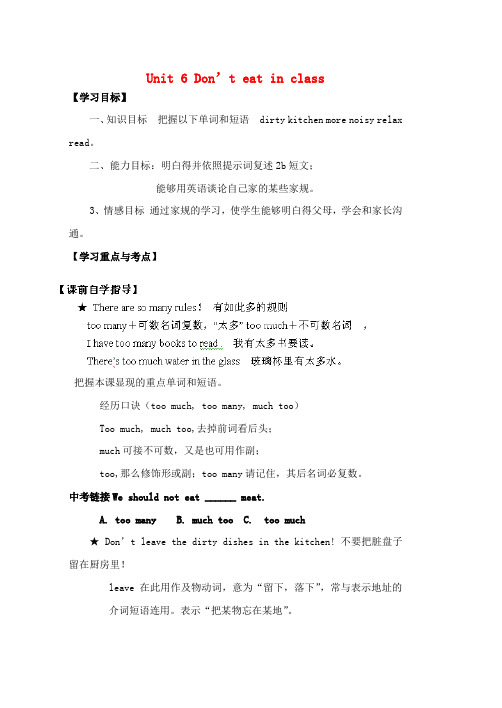
Unit 6 Don’t eat in class【学习目标】一、知识目标把握以下单词和短语 dirty kitchen more noisy relax read。
二、能力目标:明白得并依照提示词复述2b短文;能够用英语谈论自己家的某些家规。
3、情感目标通过家规的学习,使学生能够明白得父母,学会和家长沟通。
【学习重点与考点】把握本课显现的重点单词和短语。
经历口诀(too much, too many, much too)Too much, much too,去掉前词看后头;much可接不可数,又是也可用作副;too,那么修饰形或副;too many请记住,其后名词必复数。
中考链接We should not eat ______ meat.A. too manyB. much tooC. too much★Don’t leave the dirty dishes in the kitchen! 不要把脏盘子留在厨房里!leave在此用作及物动词,意为“留下,落下”,常与表示地址的介词短语连用。
表示“把某物忘在某地”。
Don’t leave your book at home next time .★ At school, we have more rules----don’t be noisy, don’t eat in class.在学校,咱们有更多的规那么----不要吵闹,不要在课堂上吃东西。
noisy,形容词,意为“吵闹的喧闹的”, 其反义词为quiet “安静的”Don’t be noisy! Be quiet, please! 不要吵闹!请维持安静。
【拓展】noise 名词,意为“喧闹声,噪音’; noisily副词,意为”吵闹地”Don’t make so much noise. Dad is sleeping in the next room.★After dinner, I can’t relax either.晚餐后,我也不能放松。
- 1、下载文档前请自行甄别文档内容的完整性,平台不提供额外的编辑、内容补充、找答案等附加服务。
- 2、"仅部分预览"的文档,不可在线预览部分如存在完整性等问题,可反馈申请退款(可完整预览的文档不适用该条件!)。
- 3、如文档侵犯您的权益,请联系客服反馈,我们会尽快为您处理(人工客服工作时间:9:00-18:30)。
Unit 6 Don’t eat in class(45分钟 100分)第Ⅰ卷(共45分)一、听力选择(10分)(一)录音中有五个句子,每个句子听一遍,然后从每小题A、B、C中选出适合每个句子的答语。
(5分)1. A. In the classroom. B. In the dining hall.C. In the music room.2. A. Clean the classroom every day.B. Run in the hallways.C. Listen to music in the library.3. A. Yes, we do. B. No, we can’t.C. Yes, we have.4. A. I can’t stand it. B. On Long Street.C. That sounds great.5. A. Yes, we can. B. No, you can’t.C. No, I can’t.(二)录音中有一篇短文,听短文两遍,然后从每小题A、B、C中选出能回答每个问题的正确答案。
(5分)6. What does Dave have to do at seven o’clock?A. Get up at six o’clock.B. Have breakfast.C. Get to school.7. What can’t Dave do in the classroom?A. Eat or drink.B. Listen to music.C. Draw pictures.8. Where can’t Dave run?A. On the playground.B. In the garden.C. In the hallways.9. What does Dave have to learn every afternoon?A. Play ping-pong.B. Draw pictures.C. Play the piano.10. Does Dave have to do his homework at school?A. No, he doesn’t.B. Yes, he does.C. We don’t know.二、单项填空(15分)1. His mother wants him to play _____ piano, but he likes playing _____ basketball.A. the; theB. the; /C. /; theD. /; /2. Mr. Black always goes to work _____ time. He is never late.A. atB. onC. inD. with3. —_____ I go out with my friends, Mom?—No, you can’t. You must do your homework first.A. MustB. Have toC. DoD. Can4. —_____ soccer in the street, children.—Sorry, we won’t do that again.A. Not playB. Can’t playC. Doesn’t playD. Don’t play5. The boy likes the T-shirt very much. He always _____ it.A. wearB. wearsC. inD. puts on6. —Where is your mom, Jim?—Oh, she is making breakfast in the _____.A. bedroomB. living roomC. kitchenD. dining room7. It takes him _____ time to play computer games.A. too muchB. too manyC. much tooD. many too8. Please remember _____ him the book. He needs it.A. givingB. giveC. to giveD. gives9. They don’t go to school on Saturday. We don’t go to school on Saturday, _____.A. tooB. eitherC. alsoD. or10. There _____ many students on the playground now.A. isB. areC. beD. have三、完形填空(10分)Every school has its own rules. How many 1 are there in your school? At some schools, the students 2 to wear uniforms on school days. But many students don’t like to wear uniforms. They think the uniforms are the ugliest 3 in the world. But the school don’t allow students to wear 4 own clothes at school. So some students draw cartoons or some famous singers on their 5 . They think it is very 6 that everyone wears the same. It is very unfair(不公平的) that teachers and students are wearing 7 . But most of the students 8 the rules. What do you think 9 it? Do you 10 your school uniforms?1. A. students B. rulesC. uniformsD. rulers2. A. has B. must C. should D. have3. A. clothes B. shirts C. skirts D. cloth4. A. their B. theyC. themD. themselves5. A. school bags B. booksC. uniformsD. desks6. A. bored B. boringC. interestingD. interested7. A. same B. differentlyC. differentD. the same8. A. obey B. agree C. listen D. listen to9. A. of B. about C. by D. for10. A. like B. make C. wash D. put on四、阅读理解(10分)◆Don’t bring any dangerous things.◆If you are late, go into the theater quietly.◆The use of cameras and videos is not allowed(被允许).◆Turn off(关上) your mobile phones.◆Please check your seat number and be seated before the play begins.◆ Please check(检查) the date and seat number when you buy your tickets. After selling the tickets out, there is no refund.1. The play begins at _____.A. 7: 00 p. m.B. 9: 00 a. m.C. 7: 00 a. m.D. 9: 00 p. m.2. Your seat number is _____.A. 9, Row 6B. 6, Row 9C. 10, Row 6D. 7, Row 93. If you are late for the play, you should _____.A. walk aroundB. call your friendC. make much noiseD. go into the theater quietly4. You should _____ at the theater.A. use cameras and videosB. sell your ticketC. talk with your friend loudlyD. check your seat number5. The underlined word “refund” means _____.A. 入场B. 出场C. 退票D. 签票第Ⅱ卷(共55分)五、听力填表(5分)录音中有一段对话,听对话两遍后,根据所听到的内容填写下面的表格。
六、单词拼写(5分)根据句意完成句中已给出首字母的单词。
1. I think students should follow the school r_____.2. We have to be q_____ in the library.3. Don’t go out b_____ you finish your homework.4. The room is too small. Let’s go o_____.5. He is too busy these days. He wants to r_____.七、阅读表达(10分)My name is Li Wei. I am 15 years old. I study in No. 1 Middle School.In our school, we have many rules. We have to get up early in the morning. After a quick breakfast, we hurry(赶快)to school. We can’t arrive late for class. 3. We can’t fight or eat in the classroom. We can’t listen to music or run in the hallways. We have lunch in the dining hall. We should be quiet when we eat lunch. 4. We have to wear uniforms to school every day. We should finish(完成)our homework on time. We can’t watch TV or play computer games on school nights. We have to go to bed before(在……以前)10 o’clock.(一)根据短文回答问题1. Where do they have lunch?___________________________________________________________________2. When do they have to go to bed?___________________________________________________________________(二)将画线部分翻译成汉语3. __________________________________________________________________4. __________________________________________________________________(三)给短文拟一个适当的标题5. __________________________________________________________________八、完成句子(10分)1. 我们应该让窗子开着。
